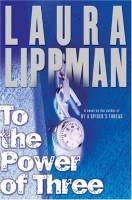




The Last Class
My last class at Goucher College will be held this week. By tradition -- if one can claim tradition on the basis of doing something twice -- I'll bring pizza to class, either from Fortunato's or Matthew's. (I prefer the latter, but Fortunato's is closer to the Towson campus and will arrive hotter.) I'll offer a variety -- vegetarian, plain, one with meat. Even so, I'll probably disappoint at least one student, or find out that someone doesn't eat pizza at all. They're a healthy bunch; I was amazed to hear them discussing the new FDA food pyramid in a recent break.
So why bring them pizza at all? To illustrate the central flaw in writing workshops -- a group of people is seldom going to agree on anything, even something as simple as an order of pizza, so how can we agree on what makes a good story, or how a story might be improved? Decisions can be reached by consensus, but the consensus isn't always right. And while there are objective standards for pizza -- see Ed Levine's A Slice of Heaven for a complete overview -- even educated palates can agree to disagree on what is "best."
Does this mean I disapprove of writing workshops? Absolutely not. I think workshops are great -- in moderation. (If I had a family crest, I would want that to be my motto: Moderation in all things -- including moderation.) I took two such workshops during my own college days and continued to work in groups into my 20s, most notably under Sandra Cisneros.
I have such fond memories of that group. We met in the Women's Peace House on West Sixth Street in Austin, then a not-bad 75-minute trek from my home in San Antonio. (The area is so much more congested now that I doubt one can fly along I-35 as I did in those days.) The names escape me in most cases, but I remember the faces and the stories, particularly those inspired by one woman's time in a remote Mexican village, whose entire culture was about to be forever changed by the construction of a highway. And, of course, I remember reading an early version of what would become the title story in Sandra's Woman Hollering Creek.
Sandra left to take a teaching job in California. Later, she would write to me that she was living on hand-to-mouth at the time, counting the change in her purse to see if she could afford coffee after class. I missed her, but I benefited just as much from the teacher who replaced her -- a woman who clearly hated my work. And, possibly, me. But I think it was just the work. She criticized me as an interloper, writing about a place (Texas) I could never understand. Her harsh criticism was a shock, coming after Sandra's gentle encouragement.
But it was a good shock. It toughened me up, made me determined. Anger is my favorite fuel, which is why I cultivate it. Let me quote again a favorite line from Philip Roth, about the short stories of a continuing education student who will become the teacher's lover:When I moved back to Baltimore, I signed up for another writing class through Johns Hopkins' continuing education program, but I found the group process was no longer for me. Sometimes, I envy my writing peers - Sujata Massey, Marcia Talley, S.J. Rozan, Keith Snyder -- who continue to work in groups. When their work heads out into the world, they have the solace of early feedback from several smart readers. I work within a tighter circle, showing my work to as few people as possible pre-publication, which can be nerve-wracking."With painstaking diligence she chronicled the habits and attitudes of her aunts, as though with each precise detail she was hurling a small stone back through her past at those pinch-faced little prosecutors."
Another tradition in the last class -- another tradition based on once -- is reading the worst review I've ever received. Bear in mind, it's not the cruelest, which was also so wrong-headed that it was easy to dismiss. This is a thoughtful, nuanced piece that judged the work, Every Secret Thing, by the very standards I had set for myself -- and rated me a dismal failure. The writer is unknown to me; I can neither dismiss her as a fool nor elevate her to god-like authority.
This is the price, I tell my students. If you get lucky enough to publish and make a life as awriter, you will enter a field where anyone -- truly anyone, in our Internet age -- can make vicious, even personal, assessments. Get used to it. Toughen up. It's a relatively small price to pay for being published.
Feel free to hurl those words, like so many small stones, back at me in June. And if you want to do it in person, check here for tour dates.
